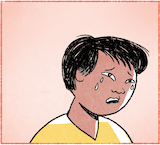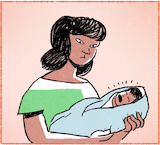


เขากำลังเฮ็ดหญัง เขากำลังฮ้องไห้
มีพุซายพุหนึ่ง เขากำลังฮ้องไห้ จักว่าเขาเป็นอี่หยัง จักเขาเฮ็ดอี่หยังมาเขาคือฮ้องไห้ เขาอาดสิเสียใจกะได้ เขากะเลยฮ้องไห้
12
เขากำลังเฮ็ดหญัง กะมีพุหญิงพุหนึ่ง เขากำลังฮ้องไห้อยู่
จักว่าเขาเป็นอี่หยังได้แต่ฮ้องไห้ แนมไปกะเห็นแต่เขาฮ้องไห้อยู่
เขาฮ้องไห้อยู่จักคน กะฮ้องอยู่พุเดียว จักว่าเขาฮ้องไห้อยู่ใส เห็นแต่เขาฮ้องไห้อยู่
คนที่ฮ้องไห้นี้ เขาฮ้องไห้เฮ็ดหญัง เป็นหญังกะคือฮ้องไห้ เขาเสียใจหลือว่าเขาดีใจ กะแล้วแต่สะถานะกาน บางเที่ยคนดีใจหลายๆ เขากะฮ้องไห้ออกมากะได้ บางคนเขาเสียใจหลายๆ เขากะฮ้องไห้ออกมากะได้ แล้วแต่สะถานะกาน แล้วแต่คน แล้วแต่นะตอนนั้น
13
เขากำลังเฮ็ดหญัง กะมีพุหญิงพุหนึ่ง เขากำลังเอาลูกอยู่ เอาลูกเด็กน้อยหนิหละ กำลังอุ้มอยู่
จักว่าเด็กน้อยเป็นอี่หยัง เบิ่งซงแล้วเป็นตาคือสิฮ้องไห้หนิหละ เบิ่งหน้าเบิ่งตาแล้วคือสิฮ้องไห้คือใดบุ
พุหญิงคนนี้ หลือว่าพุพุนี้ เขาอาดสิเป็นแม่ของเด็กน้อยคนนี้กะได้ เขากะเลยอุ้มเอาเด็กน้อยคนนี้
แล้วเขาสิเฮ็ดจั่งใดกับเด็กน้อยคนนี้ ขั้นเขาอยากสิให้เด็กน้อยคนนี้เซาฮ้องไห้ หลือว่าเซาฮ้อง เขากะต้อง[โอ]เอา หลือว่าปอบเอา ให้ลูกเซาฮ้องไห้ ให้เด็กน้อยเซาฮ้องไห้หนั้นหละ
Link to overview page
Link to dictionary
| Isaan | Pronunciation | Tones | Thai | English/Notes |
|---|---|---|---|---|
| เขา | khao | M | เขา | personal pronoun: he, she |
| กำลัง | gam-laŋ | M-HR | กำลัง | auxiliary indicating continuous or progressive action |
| เฮ็ด | het | H | ทำ | to do, to make |
| หญัง | ɲaŋ | M | อะไร, เป็นหญัง = ทำไม | 1. what {เขากำลังเฮ็ดหญัง = What is he doing?} {ธูปเอาไว้เฮ็ดหญัง = What are incense sticks for?} 2. something, anything, (nothing) 3. เป็นหญัง[...]คือ in initial position: why {เป็นหญังเขาคือใส่บักพิกลงไปในกวยเตียว = Why is he putting chili in [his] noodle soup?} {เป็นหญังหน้าต่างมันคือเปิด = Why is the window open?} {เป็นหญังมันคือมีควนไฟ = Why is there smoke?} |
| ฮ้องไห้ | hɔ:ŋ-hai | HF-LF | ร้องไห้ | to cry, to weep |
| มี | mi: | HR | มี | 1. to have 2. there is |
| พุซาย | phu-sa:i | H-HR | ผู้ชาย | man, male |
| พุ | phu | H | ผู้ | 1. person 2. clf. for people {พุหญิงพุหนึ่ง พุซายพุหนึ่ง = a woman, a man} {ซู่พุซู่คน = everybody} {พุหนึ่งโตจ่อยๆ พุหนึ่งโตบักอ้วนหนึ่ง = one person is slim, the other is fat} Notes: pronunciation: also realized as พู่- |
| หนึ่ง | nʉŋ | H | หนึ่ง | 1. one 2. after adjective: intensifier {บักคักหนึ่ง = very much} {อันบักใหญ่หนึ่ง = very large}, or attenuates the meaning {กะดาดมันแผ่นน้อยๆ หนึ่ง = the piece of paper is [relatively] small} |
| จัก | jak | M | จัก | 1. answer to a question: [I] don't know, don't know exactly, [I'm] not sure {พุซายคนนี้เขาเถ้าไป่ จัก จักเถ้าหลือบ่เถ้า เบิ่งบ่ค่อยออก = Is this man here already old? I don't know. I can't see clearly whether he's old or not.} {เขาเว้ากันอยู่ใส จักคือกัน = Where are they talking? I don't know either.} 2. exact(ly), what exactly {จักต้มอี่หยังกะบ่ฮู้ = I don't know what (exactly) he is cooking} {บ่ลู้คือกันจักปาอี่หยัง = I don't know either what kind of fish this is} 3. how much/many? {ต้นไม้มีจักต้น = How many trees are there?} {ตอนนี้จักโมงแล้ว = What time is it now?} {มือของเฮานี้สิมีจักนิ้ว = How many fingers do our hands have?} 4. a bit, a little bit {จักหน่อย/จักหน่อยหนึ่ง = a bit, a little bit} |
| ว่า | wa: | H | ว่า | 1. that, as {คำว่า X = the word X} 2. to say |
| เป็น | pen | M | เป็น | 1. to be, to exist 2. to be able to 3. to suffer, sth. happens to 4. เป็นหญัง[...]คือ in initial position: why? {เป็นหญังเขากะคือแปงฟัน = Why is he brushing his teeth?} {เป็นหญังเคี่ยงบินมันคือสิตก = Why is the airplane falling down?} |
| อี่หยัง | i:-yaŋ | H-M | อะไร | 1. what {นี้คืออี่หยัง = What is this?} {มื้อนี้เจ้าเฮ็ดอี่หยัง = What are you doing today?} {กินเข้างายกับอี่หยัง = What did you have for breakfast?} 2. something, anything, (in negations) nothing {บ่ต้องเฮ็ดอี่หยังอีกเลยนอกจากใส่ปุย = [we] don't need to do anything besides adding fertilizer} |
| มา | ma: | HR | มา | 1. to come 2. auxiliary expressing action towards the present or focal time {กะคุเฮ็ดมาจากอี่หยัง = What is the bucket made of?} {แล้วเขากะเก็บเงินจากพุนั้นมา = and then she takes the money of that person} |
| คือ | khʉ: | HR | คือ | 1. to be, to resemble, like, as 2. why {บักหล้าคือบ่เก็บโต่ะแน่ = [addressing a young boy] Why haven't you cleared the table?} |
| อาด | a:t | LF | อาจ | 1. might, may, will 2. likely |
| สิ | si | M | จะ | future tense auxiliary {เขากำลังสิตื่น = he's about to wake up} {สิไปตะหลาด = [I'm] going to the market} |
| เสียใจ | si:a-jai | M-M | เสียใจ | sad |
| กะ | ga | M | ก็ | 1. then, consequently 2. also |
| ได้ | dai | HF | ได้ | 1. can 2. to get, to obtain 3. before verb: indicating past tense 4. บ่ได้ + verb: not |
| เลย | lə:i | HR | เลย | 1. futher on, beyond, past {เข็มน้อยเลยเลขสิบสองไป = the minute hand has passed number twelve} 2. too much 3. at all 4. definitively 5. completely, utterly |
| พุหญิง | phu-ɲiŋ | H-M | ผู้หญิง | woman, female |
| อยู่ | yu: | H | อยู่ | 1. to be (located) at 2. yet, still 3. auxiliary indicating continuous or progressive action {ทอดปาอยู่ในกะทะ = (in the process of) frying a fish in the pan} {แม่กำลังเมี้ยนเฮียนอยู่ = mother is cleaning/tidying up the house} |
| แต่ | tɛ: | H | แต่ | 1. but {แต่บ่ต่างกันหลาย = but not very different} {แต่บ่ลู้ว่าเขาญ่างมาแต่ใส = but [I] don't know where he's coming from, see also: แต่ว่า} 2. only {ตอนนี้มีแต่ขี้ฝ้า = now there are only clouds} |
| แนม | nɛ:m | HR | มอง | to look, to glance, to stare {เขากำลังยืนแนมก้อนหินอยู่ = he's standing and looking at the stone/rock} {ข้างหนึ่งแนมเห็น อีกข้างหนึ่งแนมบ่เห็น = [we] see one side, [we] can't/don't see the other side} |
| ไป | pai | M | ไป | 1. to go 2. auxiliary indicating action extending into the future |
| เห็น | hen | M | เห็น | to see |
| คน | khon | HR | คน | person, people |
| ฮ้อง | hɔ:ŋ | HF | ร้อง | 1. to cry (also short for ฮ้องไห้), to call 2. to shriek |
| พุเดียว | phu-di:ao | H-M | คนเดียว | 1. alone, by oneself {เขากำลังยืนอยู่พุเดียว = she's standing by herself} {เขานั่งอยู่พุเดียว = he's sitting by himself} 2. one person |
| ใส | sai | M | (ที่)ไหน | 1. where? {สิไปใส = Where are [you] going?} {มาแต่ใส = Where are [you] coming from?} {กะทะอยู่ใส = Where's the pan?} 2. somewhere, anywhere {ใสกะได้ = anywhere, wherever you like} |
| ที่ | thi: | H | ที่ | 1. that, which {คนที่ยืนอยู่ฝั่งขวา = the person which is standing on the right = the person standing on the right} {เว้าคำที่บ่สุพาบ = to speak words which are impolite = to speak impolitely} 2. for ordinal numbers {ที่สาม = third} |
| นี้ | ni: | HF | นี้ | 1. this 2. here |
| หลือ | lʉ: | M | หรือ | or |
| ดีใจ | di:-jai | M-M | ดีใจ | happy, glad |
| แล้วแต่ | lɛ:o-tɛ: | HF-H | แล้วแต่ | up to, depending on |
| สะถานะกาน | sa-tha:-na-ga:n | M-M-H-M | สถานการณ์ | situation |
| บาง | ba:ŋ | M | บาง | 1. some {สัดบางโตบ่มีขา = some animals don't have legs} {บางคนสิมักกินกวยเตียวแทนเข้า = some people like to eat noodle soup instead of rice (dishes)} {บางสิ่งบางอย่าง = something, anything} 2. thin |
| เที่ย | thi:a | H | ครั้ง, เที่ยว | clf. for times, rounds {บางเที่ย = sometimes} |
| หลาย | la:i | M | เยอะ, มาก | many, much, very |
| ออก | ɔ:k | LF | ออก | 1. to go out, to leave 2. out |
| นะ | na | H | ณ | 1. place, time 2. at |
| ตอน | tɔ:n | M | ตอน | when, period {ตอนสองโมงเซ้า = at 8 o'clock in the morning} {ในตอนกินเข้า = when eating} |
| นั้น | nan | HF | นั้น | that, there |
| เอา | ao | M | เอา | to take, to give {เขากำลังเอาก่องไปซั่ง = he's taking the boxes to weigh them} {หมอกำลังเอายาให้คนป่วยกิน = the doctor is giving medicine to the patient} {เอาไว้ถ้า = is for, is used for, has the purpose of} |
| ลูก | lu:k | HF | ลูก | 1. child 2. clf. for balls, fruits (lime), mountains |
| เด็กน้อย | dek-nɔ:i | M-HF | เด็ก, เด็กน้อย | child |
| หนิหละ | ni-la | M-M | นี่แหละ | auxiliary for emphasis at the end of a phrase Notes: variant of นี้หละ |
| อุ้ม | um | HF | อุ้ม | to hold/carry in one's arms |
| เบิ่ง | bəŋ | H | ดู | 1. to look at, to see, to watch {เบิ่งโทละทัด = to watch TV} {เบิ่งหนัง = to watch a movie} 2. to guess {เบิ่งซงแล้ว ... = [I] guess / from what it looks like ...} |
| ซง | soŋ | HR | ทรง | 1. shape, form 2. as if, like Notes: translation to be confirmed |
| แล้ว | lɛ:o | HF | แล้ว | 1. finished 2. already 3. and then, and next (especially แล้วกะ) 4. auxiliary for past tense |
| ตา | ta: | M | ตา | as a prefix: likely, worthy, fit for (like Thai น่า-) {ตาฮัก = lovely/cute} {ตาสะออน = praiseworthy} {ตาหวาน = (of ice cream) [likely to be] sweet} {ตาอยู่ = to be a good place to be} Notes: see also various entries for ตา-, e.g., ตาแซบ, ตาพู่ฮ้าย, ตาย้าน, ตาอยากหัว, ตาฮัก, ตามีแฮง |
| หน้า | na: | LF | หน้า | 1. front {ปะตูหน้า = front door} 2. face {เขากำลังล้างหน้า = he's washing his face} 3. auxiliary: conditional tense {เขาหน้าสิเป็นพุบ่าวพุสาวกัน = they are probably groom and bride} {กะหน้าสิส้มอยู่ = it's likely to be sour} 4. season {หน้าฮ้อน = hot season} 5. page 6. clf. for pages {เฮาอ่านฮอดหน้านั้นแล้ว = we've read until this page} |
| ตา | ta: | M | ตา | eye {เขามีตาสองข้าง = he's got two eyes} {หลับตา = to close one's eyes} |
| คือใดบุ | khʉ:-dai-bu | HR-M-M | 1. who knows? 2. maybe |
|
| แม่ | mɛ: | H | แม่ | mother |
| ของ | khɔ:ŋ | M | ของ | of, belonging to |
| จั่งใด | jaŋ-dai | H-M | ยังไง, แบบไหน | how, in what manner {บักนาวมันมีลดซาดจั่งใด = Lime fruits have what kind of taste?} {เขาปิดแอจั่งใด = How is he switching off the A/C?} {เทียนใซ้จั่งใด = How's a candle used?} {สิใซ้จั่งใด = how is [it] used?} |
| กับ | gap | M | กับ | 1. and {ลุงกับป้า = uncle and aunt} {กวยเตียวหมูกับกวยเตียวไก่ = noodle soup with pork and noodle soup with chicken} 2. with, to {ค้ายๆ กับคำว่า ... = similar to the word ...} 3. prefix in front of foods {กับเข้า = side dishes eaten with rice} {เขากินกับกวยเตียว = he's eating noodle soup} |
| ขั้น | khan | LF | เมื่อ | when, if |
| อยาก | ya:k | LF | อยาก | to want, to wish |
| ให้ | hai | LF | ให้ | 1. to give {หมอกำลังเอายาให้คนป่วยกิน = the doctor is giving the patient medicine} 2. for 3. to allow, to be allowed |
| เซา | sao | HR | จบ | 1. to stop, to be finished {น้ำมันเซาไหลแล้ว = the water has stopped flowing} {ฝนเซาตกแล้ว = it has stopped raining} {มันสิเซาเสียงดัง = (phone) it stops ringing loudly} 2. to prevent, to hinder 3. to rest {เซาเมี่ยย = to rest} |
| ต้อง | tɔŋ | HF | ต้อง | to have to, must |
| โอ | o: | M | ปลอบ | 1. to comfort, to console, to soothe 2. to calm so. down |
| เอา | ao | M | เอา | after a verb: expresses focus and continuity |
| ปอบ | pɔ:p | LF | ปลอบ | to comfort, to console, to soothe |
| หนั้นหละ | nan-la | LF-M | นั่นแหละ | auxiliary for emphasis at the end of a phrase Notes: possibly a variant of นั้นหละ |